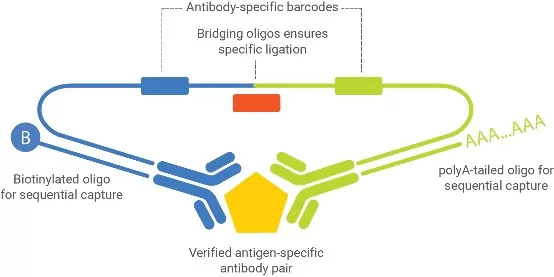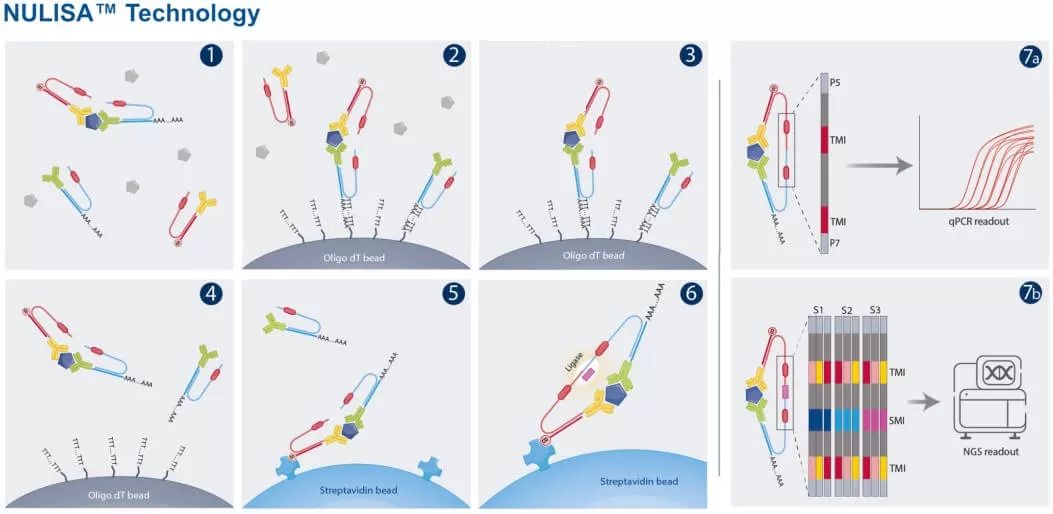Alamar Proteomics Technology: Principles and Advantages of the Nulisa and Argo HT Systems
Proteomics is one of the fastest-growing research areas in life sciences. It involves the identification and quantification of all proteins within cells, tissues, or entire organisms, helping scientists unravel the complexities of biological processes. Alamar proteomics technology, developed by Alamar Biosciences, incorporates two core innovations: the Nulisa technology and the fully automated Argo HT proteomics detection system. These advancements pave the way for high-sensitivity and high-throughput proteomic analyses, offering researchers powerful tools to delve deeper into the proteome and gain comprehensive insights into protein expression, function, and interaction in various biological contexts. In this blog, let’s delve into the mechanisms and advantages of the Nulisa and Argo HT systems to understand how they are transforming the landscape of proteomic research.
1. Mechanism of the Nulisa Technology
Nulisa, short for Nucleic acid Linked Immuno-Sandwich Assay, is an innovative technology that utilizes pairs of monoclonal antibodies and matching nucleic acid tags to specifically convert the target protein into a unique nucleic acid sequence. This method significantly enhances detection sensitivity and signal-to-noise ratio by employing dual-arm coupling for ultra-high noise reduction and exponential signal amplification through PCR. As a result, it achieves an exceptional quantitative detection sensitivity of fg/mL. For example, the limit of detection (LOD) for interleukin-13 (IL-13) is as low as 0.2 fg/mL. This remarkable sensitivity enables researchers to accurately quantify even trace amounts of proteins, facilitating groundbreaking discoveries in biomarker research and clinical diagnostics.

Nulisa technology offers exceptionally high binding specificity for target proteins. In essence, it employs two distinct DNA-antibody conjugates (or complexes), designated as A and B, to detect a single protein. Conjugate A carries a poly-A tail and a target-specific molecular identifier (TMI) sequence, while conjugate B is modified with biotin and also contains the TMI sequence. The detailed steps of the Nulisa protocol are as follows:
Binding and Capture: Conjugates A and B are added to the sample containing the target protein. The target protein forms a complex with both A and B, creating a ternary AB-target complex. This complex then binds to magnetic beads coated with oligo dT, capturing the target protein. Some of the unbound conjugate A is also non-specifically adsorbed onto the magnetic beads.
Washing: Unbound sample components and excess conjugates A and B are washed away. At this stage, any unbound conjugate A remains attached to the beads due to its poly-A tail.
Complex Release: The AB-target protein complex is released from the magnetic beads. During this step, the unbound conjugate A is also released from the beads.
Streptavidin-Biotin Binding: Streptavidin-coated magnetic beads are then introduced to capture the AB-target complex through the biotin modification on conjugate B. Unbound conjugate A, which lacks biotin, is washed away, ensuring that only the target protein-bound complexes are retained.
SMI Integration: A sample-specific molecular identifier (SMI) sequence and the necessary enzymes are added to convert the AB complex into a unique nucleic acid sequence. This integration
Quantification: The sequence of the SMI is then quantified using either qPCR or next-generation sequencing (NGS) to accurately determine the concentration of the target protein in the sample.

2. Argo HT Automated Proteomics Detection System
To meet the growing demand for high-throughput proteomics analysis, Alamar Biosciences has developed the Argo HT, an automated detection system capable of fg-level sensitivity. As a fully automated, one-touch platform, Argo HT is compatible with various NULISA panels ranging from high-plex to low-plex formats. All reagents are provided in a stable lyophilized form, facilitating automation and standardization, making it ideal for clinical testing scenarios. Key Features of the Argo HT System:
All-in-One Instrument: Integrates a qPCR system, enabling seamless, end-to-end processing from sample input to data output, or the preparation of consolidated NGS libraries in a single run.
Fully Automated Workflow: Minimizes manual intervention with total hands-on time of less than 30 minutes.
High Throughput Capability: Capable of processing up to 288 samples per batch, making it suitable for large-scale studies.
Rapid Turnaround: Delivers results in as little as 8 hours for single-plex qPCR analyses, and within 15 hours for multiplex NGS analyses.
Integrated Software and Data Analysis: Translates raw measurement data into meaningful biological insights and publication-ready results, providing a comprehensive solution for proteomics research.
The Argo HT system's advanced automation and high-throughput capabilities significantly enhance efficiency and accuracy in proteomics research, bridging the gap between experimental analysis and clinical application.
3. Advantages of Alamar Proteomics Technology
1. Ultra-High Sensitivity
The Nulisa technology and Argo HT system offer fg-level sensitivity, enabling the detection and precise quantification of extremely low-abundance proteins. This is particularly crucial for studying proteins that are expressed at low levels in cells but play significant biological roles, such as biomarkers for early disease detection or regulatory proteins in cellular signaling pathways.
2. High-Throughput Capability
Traditional proteomics techniques are often limited by throughput constraints. In contrast, the Argo HT system supports the parallel processing of large-scale samples, capable of analyzing thousands of samples in a short period. Its automation not only minimizes the need for manual intervention but also reduces experimental errors, enhancing the accuracy and consistency of the data. This capability opens new avenues for large-scale screening and analysis in proteomics research.
3. Reduced Sample Requirements
Analyzing rare or limited biological samples has long been a challenge in biomedical research. Alamar's technology can detect comprehensive protein information from minimal sample volumes, making it ideal for studies involving precious clinical specimens or early-stage disease biomarkers, where sample availability is often a constraint.
4. Automated Operation
The Argo HT system integrates fully automated processes for sample preparation, reaction setup, data acquisition, and analysis. Researchers simply need to input the initial parameters, and the system independently manages the entire workflow. This automation significantly saves time and labor, making the Argo HT system highly suitable for clinical research and large-scale drug screening applications.
5. Ultra-Multiplex Detection
The Nulisa seq 120-plex CNS panel can simultaneously quantify 120 neuro-specific and neuroinflammation-related proteins, providing a comprehensive profiling of central nervous system diseases. This multiplex capability allows for a systemic and detailed analysis of complex biological networks and disease mechanisms.
6. Broad Applicability
Alamar’s proteomics technology is compatible with a wide range of sample types, including tissues, blood, and cell lines. Moreover, the Nulisa and Argo HT systems are versatile and can be applied in various fields such as basic research, clinical diagnostics, drug development, and personalized medicine.
Next-Generation Omics Solutions:
Proteomics & Metabolomics
Ready to get started? Submit your inquiry or contact us at support-global@metwarebio.com.


